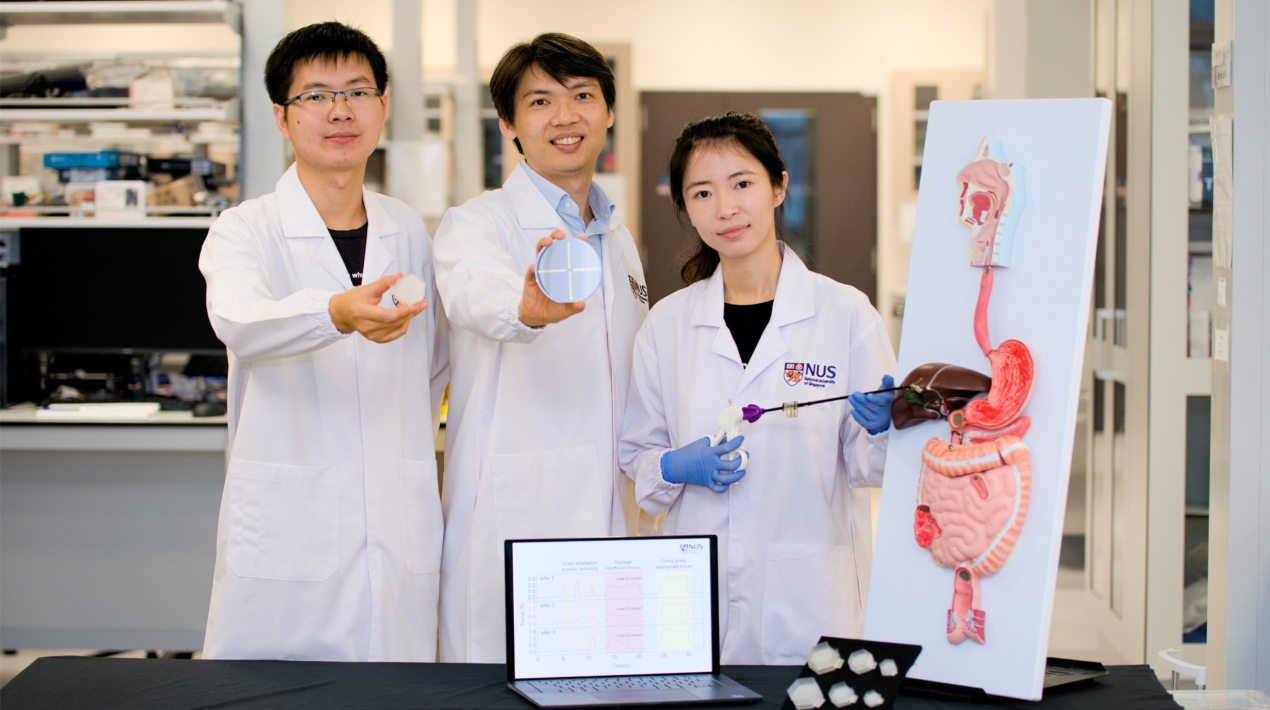
|
Getting your Trinity Audio player ready...
|
The National University of Singapore (NUS) has created the ‘eAir’, a cutting-edge aero-elastic pressure sensor. By directly addressing the issues with current pressure sensors, this technique can be used for minimally invasive procedures and implantable sensors.
The eAir sensor, led by Associate Professor Benjamin Tee at the NUS Institute for Health Innovation & Technology and NUS College of Design and Engineering, offers improved accuracy and dependability for use in medical applications.
Giving surgeons tactile feedback may revolutionise laparoscopic procedures by enabling a more accurate approach to patient tissues. The sensor can also benefit patients by providing a less invasive way to monitor intracranial pressure (ICP), a crucial health indicator for those with neurological problems.
Traditional pressure sensors usually have accuracy issues. They struggle to provide accurate readings, frequently produce inconsistent results when the same pressure is applied repeatedly, and are prone to overlooking minute pressure changes, all of which can result in substantial mistakes. They are frequently made of materials that are rigid and mechanically inflexible.
The ‘lotus leaf effect’ is a rare natural phenomenon where water droplets readily glide off the surface of the leaf, made possible by its tiny, water-repellent structures. The NUS team used this phenomenon as inspiration to address these pressure-sensing issues. The team has created a pressure sensor to mimic this behaviour and greatly enhance sensing capability.
The eAir sensor features an inventive “air spring” construction that traps a layer of air that, when in contact with the sensor’s liquid, creates an air-liquid interface. This air layer condenses as the outside pressure rises.
An alteration in electrical signals caused by a surface treatment causes the interface within the sensor to move without friction, correctly reflecting the applied pressure. This design reinvents the lotus leaf’s inherent ability to repel water into a straightforward yet sophisticated pressure-sensing device.
The size of the eAir devices, which may be manufactured to be just a few millimetres, is comparable to that of current pressure sensors. This cutting-edge technology has many practical uses. Incorporating eAir sensors, for instance, could result in safer surgical procedures and eventually improve patient recovery and prognosis in laparoscopic procedures, where precise tactile input is essential.
Assoc Prof Benjamin claims that doing procedures while using graspers presents special difficulties. Traditional tools can occasionally fall short of providing precise control and an accurate perception of the forces being delivered, forcing surgeons to rely significantly on their experience and even their intuition. However, the emergence of soft and easily integrated eAir sensors may change the game.
Surgeons can control the graspers’ jaws during minimally invasive procedures like laparoscopic or robotic surgery, but they are unable to feel what the end-effectors are grabbing. Therefore, to decide about crucial information that the sense of touch would otherwise convey, surgeons must rely on their sense of sight and years of experience. Also, smart pressure sensors have the power to revolutionise the area of minimally invasive surgery by providing haptic or tactile input.
eAir also offers a chance to enhance the procedure for measuring intracranial pressure, the pressure within the skull that may affect brain health. The technique could also revolutionise patient experiences in the care of illnesses related to the brain, from severe headaches to possible brain injury, by providing a minimally intrusive option.
The NUS team is creating the foundation for partnerships with significant figures in the medical industry. They have simultaneously applied for a patent in Singapore for the eAir sensor technology with the intention of adapting it for practical uses.
















